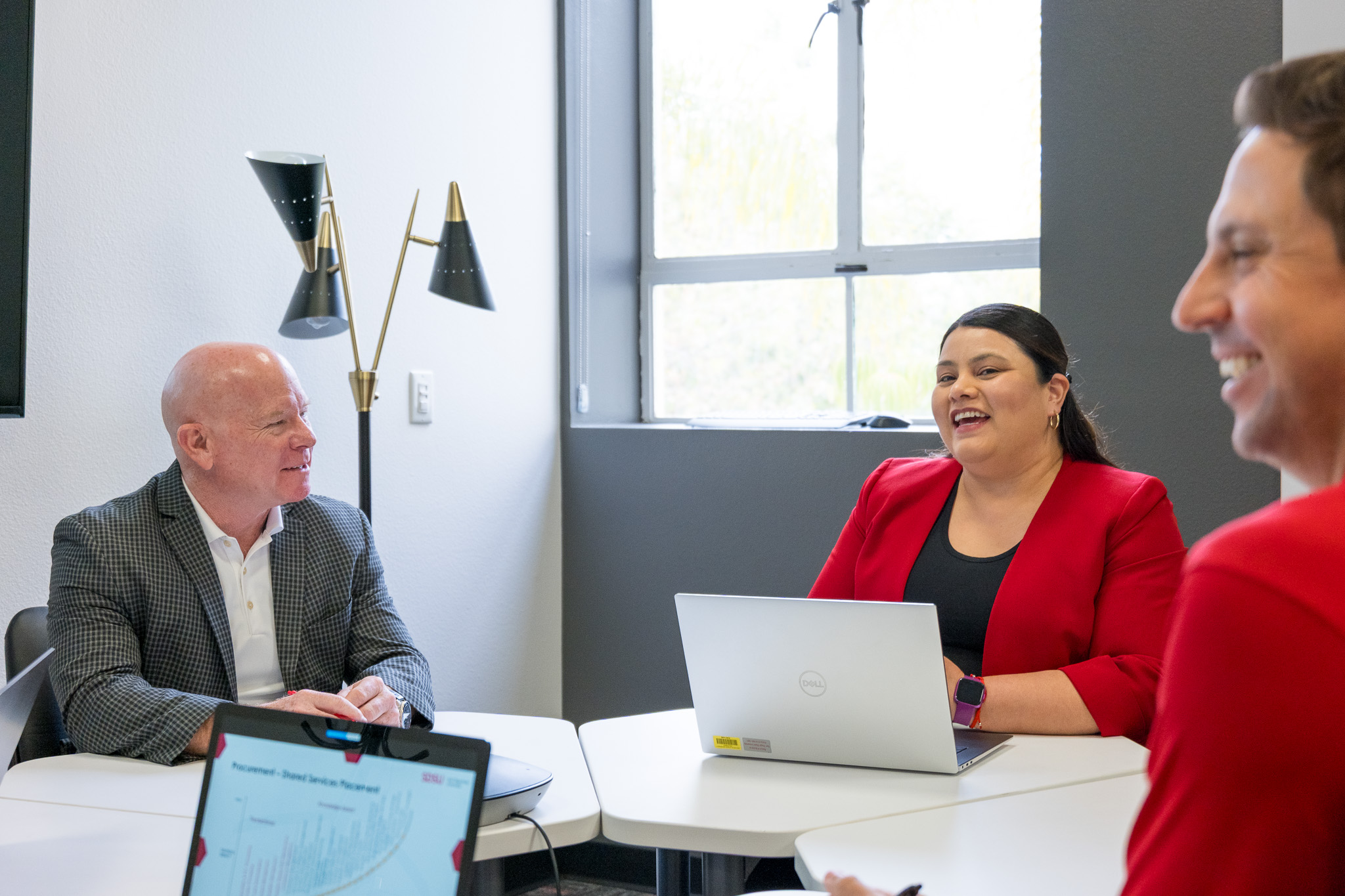
In early Spring 2024, the Shared Services team initiated the Phase II Listening Tour. While continuing their efforts in the College of Sciences pilot, Shared Services initiated conversations with Business & Financial Affairs and Academic Affairs. Utilizing the proven tools and techniques of the pilot, the second phase, Partnership, aims to continuously improve the Procure-to-Pay process along with other administrative activities.
Welcome to Shared Services

Mission Statement
Optimize time and core stakeholder competencies in pursuit of sustainable organizational excellence.
Shared Services is a time-tested model for organizing and optimizing administrative activities adopted by businesses for more than 30 years and at universities across the nation for more than a decade.
San Diego State University initiated a Shared Services pilot program with the College of Sciences in June 2024. Following the successful launch of the College of Sciences Pilot, Shared Services commenced the phased campus-wide rollout.
Shared Services Model
At the core of the Shared Services model is a desire to best enable staff to focus on their core competencies. There are three goals in our Shared Services model:
- Enhancing employee satisfaction by best aligning the right people with the right work
- Creating processes and tools that enhance the timeliness and effectiveness of SDSU’s administrative functions
- Positioning SDSU’s administrative professionals to accommodate the growth of the university while maintaining reasonable workloads and healthy work/life balances
Shared Services at SDSU
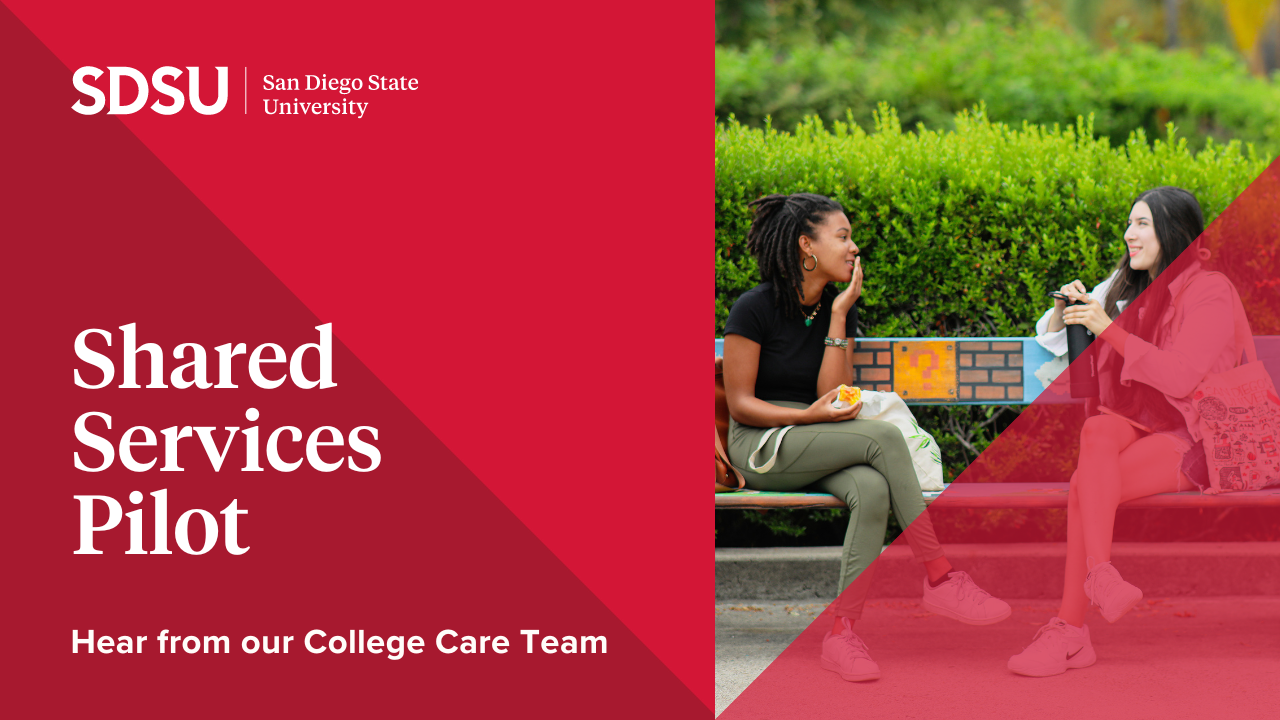
San Diego State University built the foundations of Shared Services by melding Contracts and Procurement Management with Accounts Payable to form Procure-to-Pay in Fall 2023. From there, the team initiated a Shared Services pilot program with the College of Sciences in June 2024. Following the successful launch of the College of Sciences Pilot, Shared Services commenced the phased campus-wide rollout.
2025-2026: Partnership
2022-2024: Pilot
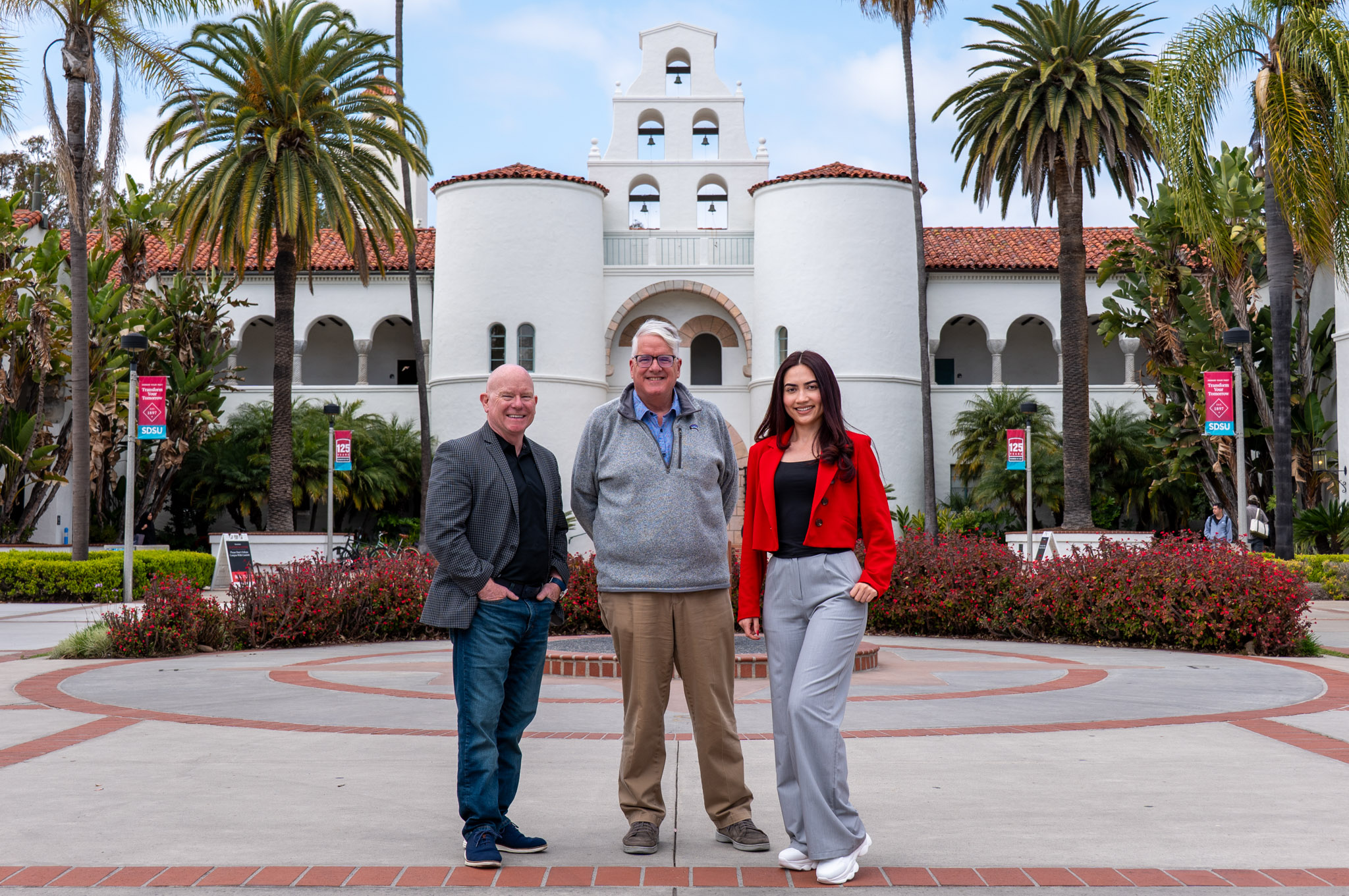
In late Spring 2024, San Diego State University launched its Shared Services pilot. As the first implementation of Shared Services at the university, the College of Sciences pilot aims to align the right people with the right work, enhance the effectiveness of startup procurement through more agile tools and processes, and create avenues for professional growth. The pilot focuses on faculty startup procurement because it directly impacts research, student engagement, and faculty effectiveness.
Strategic Plan
Implementing Shared Services is one step in San Diego State University’s strategic plan toward building a resilient and sustainable university through innovative practices.
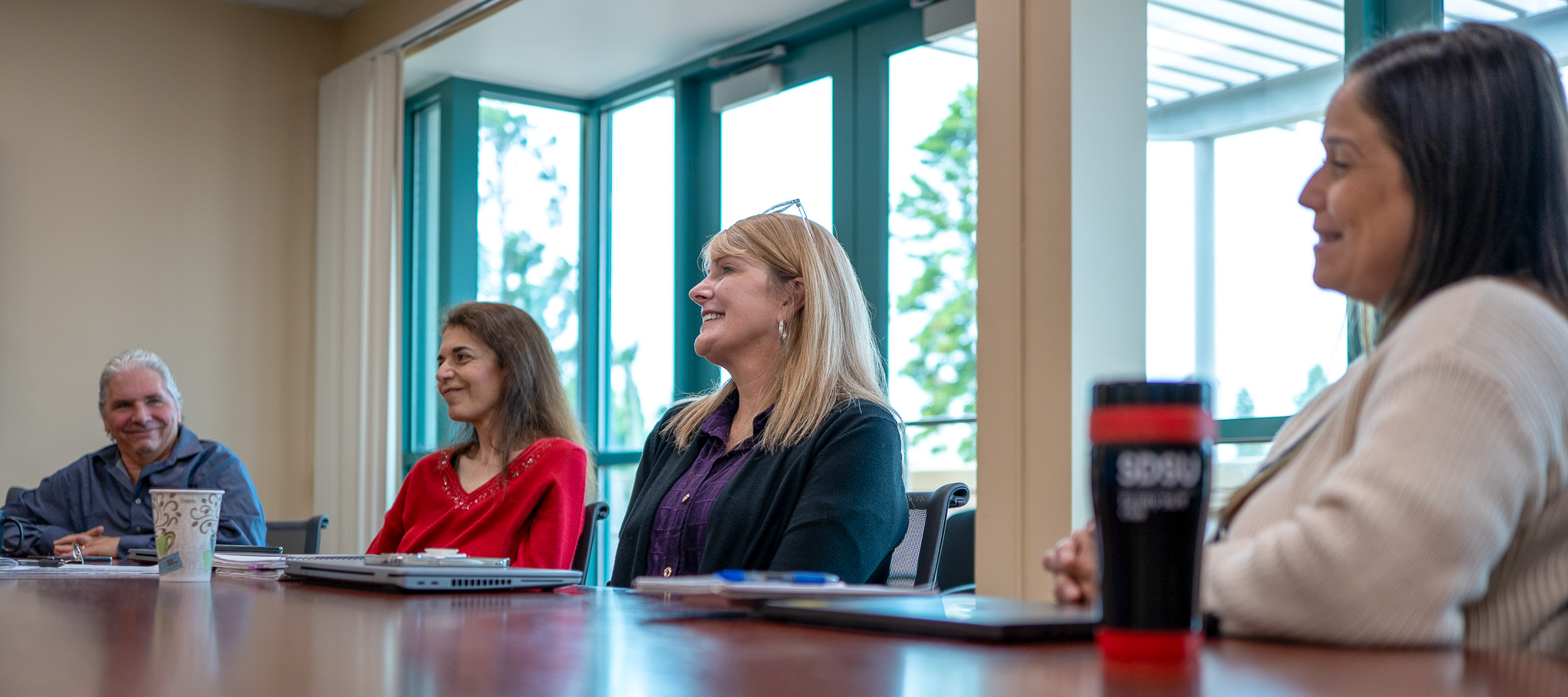
Shared Services Vision
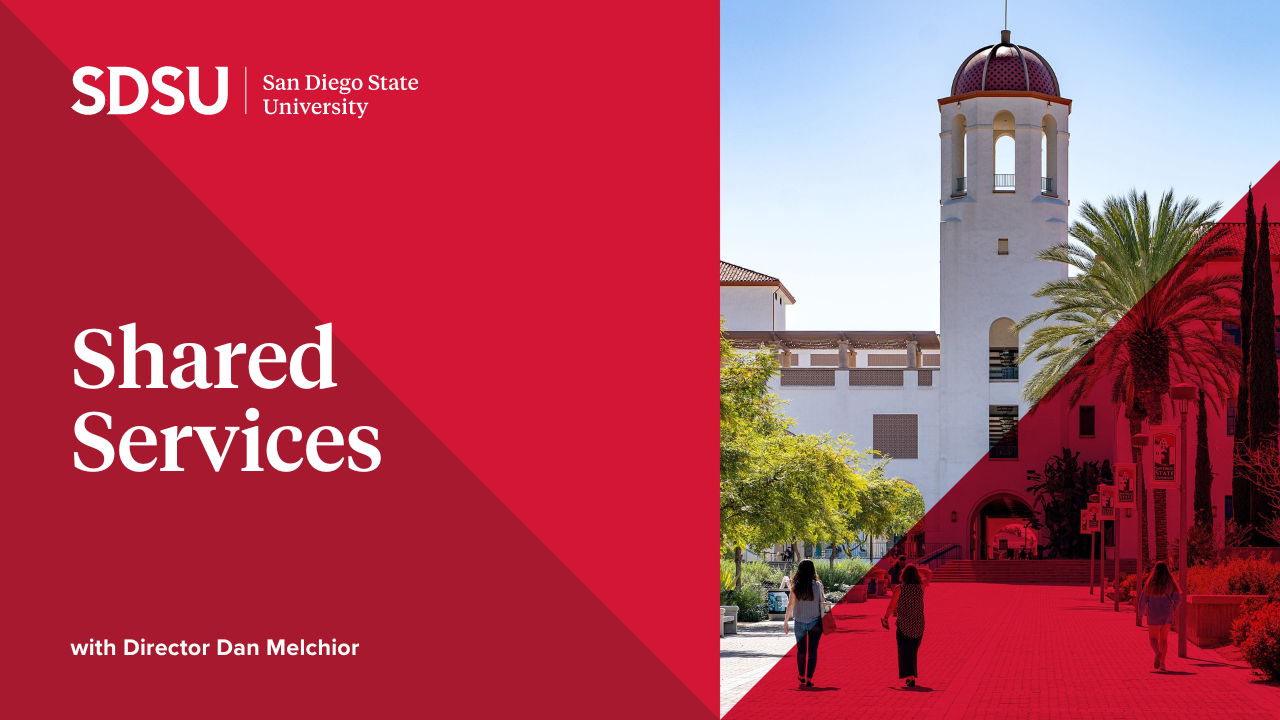
Shared Services FAQ
Shared Services is the primary method through which Finance, IT, Human Resource, Procure-to-Pay and similar administrative activities are designed, implemented, managed and optimized so that everyone can utilize their time to focus on their core competencies. The model has been utilized in different capacities for companies and organizations for more than thirty years. Colleges and universities have been utilizing Shared Services for more than a decade.
Yes, many colleges and universities across the nation have implemented Shared Services. San Diego State University is the first of the 23 California State University campuses to hire a full-time Director of Shared Services to help define, implement, and optimize our Shared Services strategy.
Like any project, Shared Services needs to be designed, implemented, and managed via proper execution, communication, and facilitation. The Shared Services model has been proven over more than three decades, but there is not a one-size-fits-all model. In successful implementations, organizations develop their models based on the ongoing needs and cultures of their campuses or organizations. At SDSU, we are designing and implementing our model methodically and thoughtfully, based on significant input over a period of months from our departments, colleges, divisions, and campus leadership.
No, it will not. As you know, San Diego State University is growing and thriving. We have many exciting current and future endeavors that promise to further our growth and expansion. Shared Services is a proven strategy that will help enable our faculty and staff to more effectively accomplish the many tasks and activities required to facilitate our continued growth.
Outsourcing will not be utilized at SDSU. Sometimes outsourcing is a tool utilized within a Shared Services organization, but it is not a necessary component. In fact, many very successful Shared Services organizations have never used outsourcing, including those that our newly appointed Director of Shared Services has designed, built, and managed.
Not at San Diego State University. While some organizations do choose to centralize jobs and responsibilities, SDSU is aligning work and responsibilities within colleges, departments, and divisions to best utilize our current and future resources and to more effectively deliver services in support of our university’s mission.
We will continue to update this page and send out future communications regarding Shared Services at SDSU. If you have questions, click the Contact Us button on the page to contact the Shared Services team. The video on the page is also an excellent resource to learn more about Shared Services at San Diego State University.
The Shared Services team welcomes your feedback and questions. Please use the Contact Us button below to contact the Shared Services team.
The College of Sciences pilot is now complete and the model is fully operational. The original Shared Services organizational structure remains the same (1 College Care Specialists and 2 College Care Coordinators). Shared Services data will be shared via our Impact Report and Executive Summary documents.
